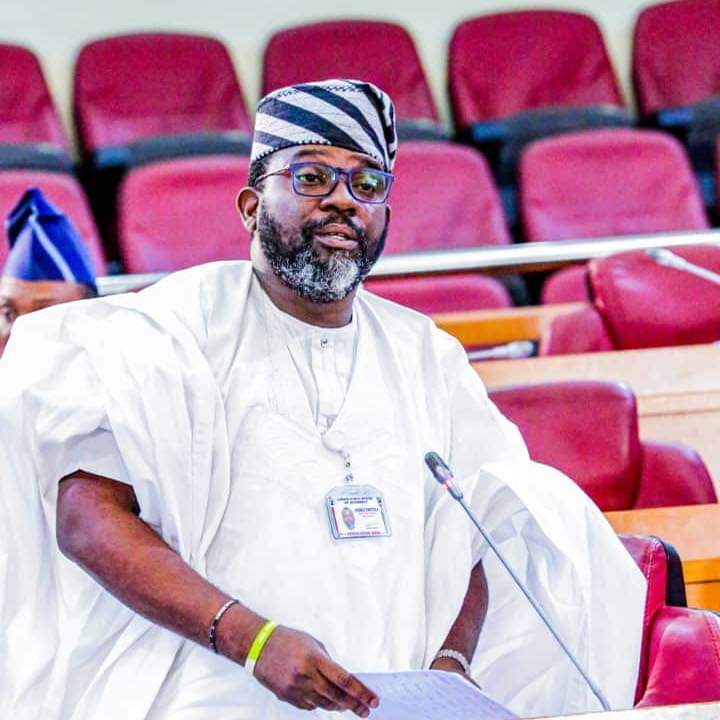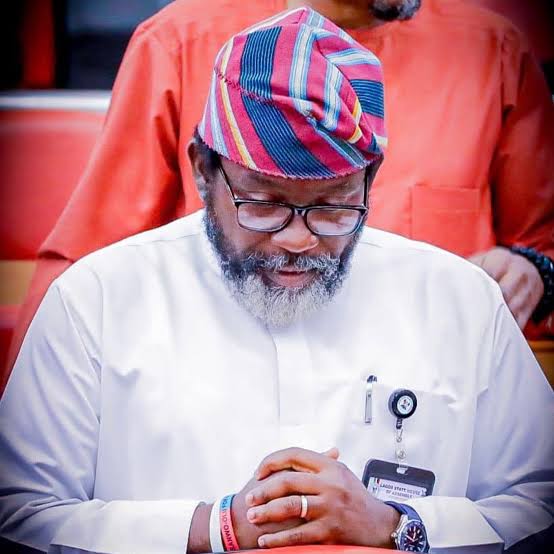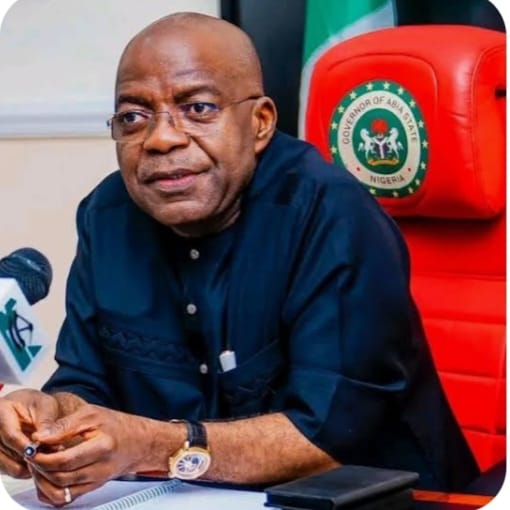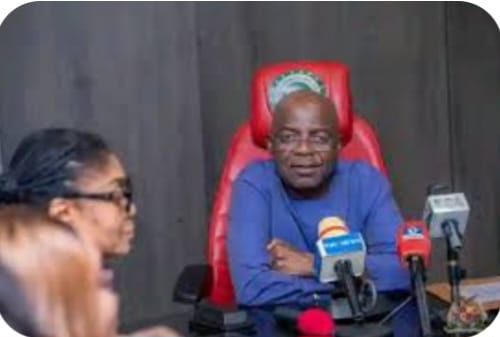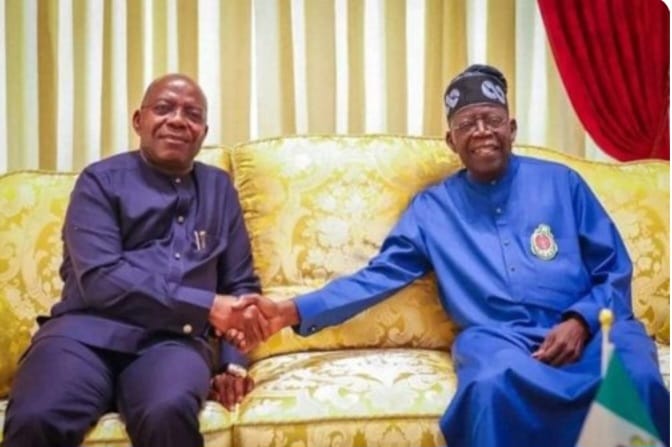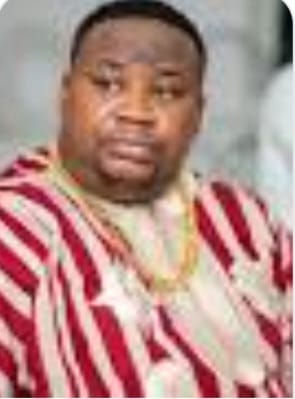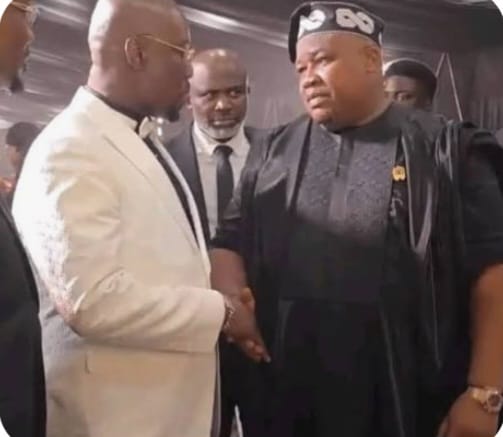Politics
Reforms will unlock Nigeria’s economic fortunes, perseverance is key

Reforms will unlock Nigeria’s economic fortunes, perseverance is key
Abuja, March 5, 2025: The current economic reforms in Nigeria are where the fortunes of the Africa’s largest economy will be unlocked, a Think Tank group, the Independent Media and Policy Initiative (IMPI), concludes after analysing the rudiments of the policies.
A policy analysis released on Tuesday in Abuja by the Chairman of IMPI, Mr Niyi Akinsiju, said it was crucial to keep eyes on the bright “spots in Nigeria’s economy’’ even as the reforms bite harder for now.
As one of the nation’s global economic entrepreneurs puts it, IMPI reports that
“while pessimism abounds, it is crucial to keep our eyes on the bright spots in Nigeria’s economy. We write off and ignore the country at our own peril; it could very well become a 22nd century superpower’’.
Akinsiju said it was to this end that we are unpretentious about the support and advocacy for the policies being advanced by President Bola Tinubu’s administration targeted at enabling a market-driven economy.
“This should be the big picture for every forward looking Nigerian. Our fate should not be about existing from one day to the other; it should be about accepting the generational responsibility of standing in the gap for future generations.
“To sacrifice our today to change the economic trend of our country where rather than have millions numbered in poverty, we will have millions counted in wealth,’’ Akinsiju said.
The Think Tank peeped into the history of the nation’s current economic milieu and the series of policies on foreign exchange market as well as the controversial subsidy in petrol and concluded that a free economy of the current administration was most ideal.
“We have to go back to June 15, 2016. Nigeria’s central bank announced it would abandon its currency’s dollar peg in preference for a free float of the Naira in an effort to alleviate the chronic foreign currency shortages choking growth in Africa’s biggest economy.
“Under one week after the announcement, the Naira slumped from the pegged rate of N197/$ to N287/$. Three months down the road, in August 2016, the rate had fallen by an aggregate 61 percent to the dollar.
“Expectedly, there was bedlam in the economic space with the din of the attendant noise becoming aggravated when Nestle Nigeria Plc, a multinational company renowned for its consistent profit outturn published its year end result with a depressing 94 percent drop in profits, a phenomenon blamed on the currency depreciation.
The depreciation also led to Nigeria losing its title as Africa’s largest economy — a symbolic downgrade that succinctly summarized the many challenges facing the country at that time.
For many followers of the national economy in that year and beyond, current happenings in the Nigerian economy are akin to walking through the same historical corridors.
Indeed, Nigerians had walked this path before and had experienced the same seeming awry economic assaults on their very existence as a people. The immediate reflex associated with such scenario was to capitulate. And capitulate, the country did.
Less than six months after the CBN’s free float policy adoption, inflation rates were skyrocketing in reflection of the vastly depreciated Naira. The CBN could not take the heat any longer. It dramatically announced a reversal to a currency pegged regime and a managed float of the Naira at the same time.
The country went back to its tradition of multi-tiers foreign exchange market. By May 2017, the country had five different forex rates. The interbank rate closed at N305.72/$ in second quarter 2017, the rate for government official transactions was N306/$, at the Investors and Exporters window, it was N360/$, and N366/$ at the parallel market.
This reversal to multiple exchange rate regime was accompanied with a capital control policy, the CBN restricted 43 items from accessing the official foreign exchange market.
In truth, the Nigerian economy had been buffeted from different sides by many domestic and global assailing factors between 2016 and 2020 which may provide an understanding of the Federal Government and CBN’s
insistence on state controlled and managed economy for the benefits of the poor and vulnerable. Yet, after many years of the control and managed options, we are left with an economy in stagnation; one that depends on the periodic boom in the oil and gas sector to deliver momentary economic prosperity.
He explained that by 2023, an economic template change had become inevitable.
“In our consideration, we believe that the Tinubu administration read the situation well by making overtures to the CBN to revert to the free float exchange policy.
Of course, the economy, like in 2016 has since responded to the policy with a volatility that is not only immediate but intense with macroeconomic rates flaring up disconcertingly. This had led to high cost of living uproar across different segments of the nation.
But rather than beat a retreat and embrace the populist option, the President has determinedly decided to walk the hard, lonely route of application of unpopular yet result oriented policy, by insisting on sustaining and driving the national economy on the wings of the already introduced policies, chief of which are the fuel subsidy removal and unification of Forex rates.
President Tinubu reinforced his commitment to going the whole hog with the implementation of these policies when he publicly declared during his visit to Qatar that: “This economy, we will grow it, and we will feed ourselves out of penury…if it’s corruption, we must exterminate it no matter how hard it is fighting back.”
We find this declaration instructive. It affirms the President’s unwavering commitment to seeing through the reforms he has undertaken to implement.
We also agree with the President’s call on Nigerians to persevere at this time because, according to him, nation-building requires perseverance and patriotism to succeed. It is to these two value orientations that we call the attention of Nigerians.
This country, by all possible evaluation metrics, is an economic giant waiting to take its position in the sun but it has remained stunted over the years because of policy misapplications, especially of such that emphasise today’s existence in opposition to creating wealth premised on delayed gratification.
We also agree with the President’s call on Nigerians to persevere at this time because, according to him, nation-building requires perseverance and patriotism to succeed.
It is to these two value orientations that we call the attention of Nigerians.
This country, by all possible evaluation metrics, is an economic giant waiting to take its position in the sun but it has remained stunted over the years because of policy misapplications, especially of such that emphasise today’s existence in opposition to creating wealth premised on delayed gratification.
With removal of subsidy in petrol, the daily consumption dropped by at almost 50 percent, a leakage that almost crippled Nigeria.
We also agree with the President’s call on Nigerians to persevere at this time because, according to him, nation-building requires perseverance and patriotism to succeed. It is to these two value orientations that we call the attention of Nigerians.
And also as we reference the robust optimism expressed by South African billionaire and Chairman of South Africa global grocer brand, Shoprite, Christo Wiese, who recently said that Nigeria’s large and growing population is impossible for businesses to ignore and that the recent exodus of companies from the country won’t last.
It is exhilarating to note that this sanguine description of the Nigerian economic state is coming from a foreigner who sat over a huge business concern that operates out of states across Nigeria. He definitely speaks from the point of knowledge and experience.
For him, Nigeria with over 200 million people, is the economic giant of Africa. This sizable consumer base presents an attractive investment hub for businesses and investors seeking opportunities in the region.
While no rational investor can ignore Nigeria, yet, economic makeovers such as the removal of fuel subsidy and floating of the naira aimed at revitalizing the economy, have yet to yield positive results.
Nonetheless, we have observed the peculiar Nigerian spirit of adaptation in the face of challenges and vicissitudes at work as exchange rates become prohibitive and inflation rates continue to increase. Nigerian startups, for example, are beginning to explore local options for some of the foreign-denominated services their operations require.
FULL STATEMENT BY IMPI
Policy Statement 08 Issued By Independent Media and Policy Initiative
Tinubu’s Reforms: We Admonish No Retreat, No Surrender
To understand the nation’s current economic milieu, we have to go back to June 15, 2016. Nigeria’s central bank, on that day, announced it would abandon its currency’s dollar peg in preference for a free float of the Naira in an effort to alleviate the chronic foreign currency shortages choking growth in Africa’s biggest economy.
Under one week after the announcement, the Naira slumped from the pegged rate of N197/$ to N287/$. Three months down the road, in August 2016, the rate had fallen by an aggregate 61 percent to the dollar.
Expectedly, there was bedlam in the economic space with the din of the attendant noise becoming aggravated when Nestle Nigeria Plc, a multinational company renowned for its consistent profit outturn published its year end result with a depressing 94 percent drop in profits, a phenomenon blamed on the currency depreciation. The depreciation also led to Nigeria losing its title as Africa’s largest economy — a symbolic downgrade that succinctly summarized the many challenges facing the country at that time.
For many followers of the national economy in that year and beyond, current happenings in the Nigerian economy are akin to walking through the same historical corridors. Indeed, Nigerians had walked this path before and had experienced the same seeming awry economic assaults on their very existence as a people. The immediate reflex associated with such scenario was to capitulate. And capitulate, the country did.
Less than six months after the CBN’s free float policy adoption, inflation rates were skyrocketing in reflection of the vastly depreciated Naira. The CBN could not take the heat any longer. It dramatically announced a reversal to a currency pegged regime and a managed float of the Naira at the same time. The country went back to its tradition of multi-tiers foreign exchange market. By May 2017, the country had five different forex rates. The interbank rate closed at N305.72/$ in second quarter 2017, the rate for government official transactions was N306/$, at the Investors and Exporters window, it was N360/$, and N366/$ at the parallel market.
This reversal to multiple exchange rate regime was accompanied with a capital control policy, the CBN restricted 43 items from accessing the official foreign exchange market.
Interestingly, the then CBN Governor, Mr Godwin Emefiele, became an advocate of managed float and insisted that adopting a free float exchange rate for the Naira is both elitist and wrong. We consider this a volte-face away from his earlier avowal on the adoption of a free float market-determined forex rate policy.
Mr Emefiele added that if the Naira was allowed to float, the poor and low income earners will suffer more in form of high inflation. That was an understandable sentiment given the large percentage of the population of extremely poor. However, it was not the solution nor the trigger for prosperity the country direly needed.
With that Emefiele declaration, the attempt to float the Naira was officially jettisoned by the CBN. For us, that was adopting populism, over economic reality.
Seven years after embracing that option, the cost to the economy became obvious. The exchange rate to the dollar depreciated by more than a 100 percent from N197/$ in June 2016 to N463/$ in June 2023 when the CBN reverted to a free float again. In the intervening years, more than $30 billion had been injected in the Forex market to defend the Naira. Despite splurging that sum in the Forex market, inflation rate continued to increase, peaking at 22.41 percent in May 2023 from 15.6 percent in May, 2016. The foreign reserve was depleted to about $30 billion leaving the CBN with less fire power to defend the Naira. The country had merely survived not developed, it was a clear scenario of stagnation.
In truth, the Nigerian economy had been buffeted from different sides by many domestic and global assailing factors between 2016 and 2020 which may provide an understanding of the Federal Government and CBN’s
insistence on state controlled and managed economy for the benefits of the poor and vulnerable. Yet, after many years of the control and managed options, we are left with an economy in stagnation; one that depends on the periodic boom in the oil and gas sector to deliver momentary economic prosperity.
By 2023, an economic template change had become inevitable. In our consideration, we believe that the Tinubu administration read the situation well by making overtures to the CBN to revert to the free float exchange policy. Of course, the economy, like in 2016 has since responded to the policy with a volatility that is not only immediate but intense with macroeconomic rates flaring up disconcertingly. This had led to high cost of living uproar across different segments of the nation.
But rather than beat a retreat and embrace the populist option, the President has determinedly decided to walk the hard, lonely route of application of unpopular yet result oriented policy, by insisting on sustaining and driving the national economy on the wings of the already introduced policies, chief of which are the fuel subsidy removal and unification of Forex rates.
President Tinubu reinforced his commitment to going the whole hog with the implementation of these policies when he publicly declared during his visit to Qatar that: “This economy, we will grow it, and we will feed ourselves out of penury…if it’s corruption, we must exterminate it no matter how hard it is fighting back.”
We find this declaration instructive. It affirms the President’s unwavering commitment to seeing through the reforms he has undertaken to implement.
We also agree with the President’s call on Nigerians to persevere at this time because, according to him, nation-building requires perseverance and patriotism to succeed. It is to these two value orientations that we call the attention of Nigerians.
This country, by all possible evaluation metrics, is an economic giant waiting to take its position in the sun but it has remained stunted over the years because of policy misapplications, especially of such that emphasise today’s existence in opposition to creating wealth premised on delayed gratification.
In this regards, we reference the robust optimism expressed by South African billionaire and Chairman of South Africa global grocer brand, Shoprite, Christo Wiese, who recently said that Nigeria’s large and growing population is impossible for businesses to ignore and that the recent exodus of companies from the country won’t last. It is exhilarating to note that this sanguine description of the Nigerian economic state is coming from a foreigner who sat over a huge business concern that operates out of states across Nigeria. He definitely speaks from the point of knowledge and experience.
For him, Nigeria with over 200 million people, is the economic giant of Africa. This sizable consumer base presents an attractive investment hub for businesses and investors seeking opportunities in the region.
While no rational investor can ignore Nigeria, yet, economic makeovers such as the removal of fuel subsidy and floating of the naira aimed at revitalizing the economy, have yet to yield positive results.
Nonetheless, we have observed the peculiar Nigerian spirit of adaptation in the face of challenges and vicissitudes at work as exchange rates become prohibitive and inflation rates continue to increase. Nigerian startups, for example, are beginning to explore local options for some of the foreign-denominated services their operations require.
This is in response to the rising cost of these services in naira terms. The depreciating currency has increased the cost burden on startups that rely on foreign cloud services such as Amazon Web Service, Microsoft Azure, and more. $1000 for cloud services that would have cost N471,000 in early 2023 is now about N1.57 million, a 233.61 percent cost increase.
Services like Slack, Google Workspace, and others that are crucial for internal communications and operations of startups have also recorded a significant rise in naira costs. Now, Nigerian digital space entrepreneurs have de-dollarised to adjust to the current reality and have started switching hosting services, using internal IPs, and optimising its overall resource use. By our latest calculations, some have achieved a reduction of annual technology infrastructure operating costs by up to 69 percent.
At the end of the day, the committed, the creative and the passionate will make a way through the labyrinth of challenges to exploit the opportunity so availed by the policies.
It is in acknowledgement of this that we also review the latest quantity of Premium Motor Spirit (petrol) importation figure which the Minister of Information and National Orientation, Mohammed Idris, says has reduced by 50 percent. That is to place the quantity imported in the region 31 million and 33 million litres. This, essentially, talks to freeing up funds that would have been tied up in importing about 66 million litres of PMS and channeling it into more productive use.
As one of the nation’s global entrepreneurs put it, while pessimism abounds, it is crucial to keep our eyes on the bright spots in Nigeria’s economy. We write off and ignore the country at our own peril; it could very well become a 22nd century superpower.
This should be the big picture for every forward looking Nigerian. Our fate should not be about existing from one day to the other; it should be about accepting the generational responsibility of standing in the gap for future generations. To sacrifice our today to change the economic trend of our country where rather than have millions numbered in poverty, we will have millions counted in wealth.
It is to this end we declare that we are unpretentious about our support and advocacy for the policies being advanced by the Tinubu’s administration targeted at enabling a market-driven economy. This is where we believe the fortunes of this great country can and would be unlocked.
Chief Niyi Akinsiju
Chairman
Independent Media and Policy Initiative (IMPI)
March 5, 2024
Politics
Why Ifako-Ijaiye’s Voice Is Louder At The Lagos Assembly: The Jah Factor
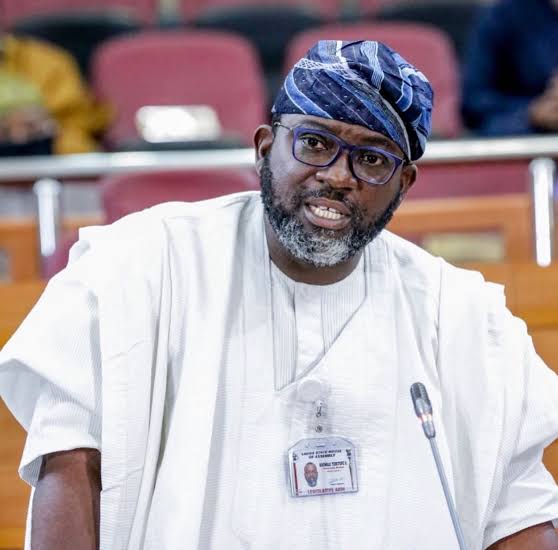
Why Ifako-Ijaiye’s Voice Is Louder At The Lagos Assembly: The Jah Factor
By Ibukun Simon
In legislative politics, not all representatives are created equal. Some merely occupy seats; others shape conversations, influence outcomes, and leave visible footprints in the lives of their people. Since 2019, Ifako-Ijaiye Constituency I has belonged firmly to the latter category, thanks to the emergence of Hon. Adewale Temitope Adedeji, fondly known as JAH, as its representative in the Lagos State House of Assembly.
As a journalist who has covered proceedings of the Lagos Assembly consistently since 2015, I have witnessed first-hand how representation can either fade into the normal routine or rise into relevance. The entry of Hon. Adedeji into the Assembly marked a clear turning point—not only for Ifako-Ijaiye, but for the quality of debate, advocacy, and people-focused legislation within the House.
On the floor of the Assembly, Hon. Adedeji stands out as one of the lawmakers journalists naturally gravitate towards. His interventions during plenary sessions are deliberate, articulate, and deeply rooted in public interest and knowledge. In the 40-member House, he is widely regarded as one of the top five lawmakers whose contributions command attention, not because of theatrics, but due to his clarity of thought, persuasive delivery, and uncommon mastery of issues. When JAH speaks, the chamber listens—and the press takes notes.
This strength of presence is crucial in a legislative environment where influence matters. In parliamentary practice, experience translates to authority. The Lagos State House of Assembly, like many legislatures, places significant weight on ranking members—lawmakers whose sustained service enhances their ability to push motions, influence committee outcomes, and attract development to their constituencies. Returning Hon. Adedeji to the House in 2027 would therefore mean strengthening Ifako-Ijaiye’s bargaining power and ensuring its concerns are not just heard, but prioritized.
Beyond the chambers, the impact of Hon. Adedeji’s representation is visible across the constituency. In terms of infrastructural development, several road construction and rehabilitation projects have been attracted to Ifako-Ijaiye under his watch, improving accessibility, boosting local businesses, and easing daily movement for residents. These are practical dividends of democracy that speak louder than campaign slogans.
Equally significant is his focus on human development and social inclusion. Since assuming office in 2019, Hon. Adedeji has facilitated job opportunities, empowered the less privileged, and consistently supported students through the distribution of JAMB and GCE forms, helping to remove financial barriers to education. These interventions reflect the impact of a representative who understands that development must touch both infrastructure and people.
What further distinguishes Hon. Adedeji is his constant engagement with constituents. Through consultations, town-hall interactions, and accessibility, he has maintained a relationship that goes beyond election cycles. This closeness has fostered trust and ensured that governance remains responsive to grassroots realities.
As Lagos continues to grow and legislative responsibilities become more demanding, constituencies like Ifako-Ijaiye cannot afford experimental representation. They require lawmakers who understand the system, command respect within it, and can translate legislative influence into real benefits for the people.
From the Assembly floor to the streets of Ifako-Ijaiye, the record since 2019 is clear: effective representation works—and Hon. Adewale Temitope Adedeji has delivered it.
Ibukun writes from Ifako-Ijaiye.
Politics
Lack of Understanding or Legitimate Concern? Otti’s Defence of Tinubu’s Tax Reform Sparks National Debate
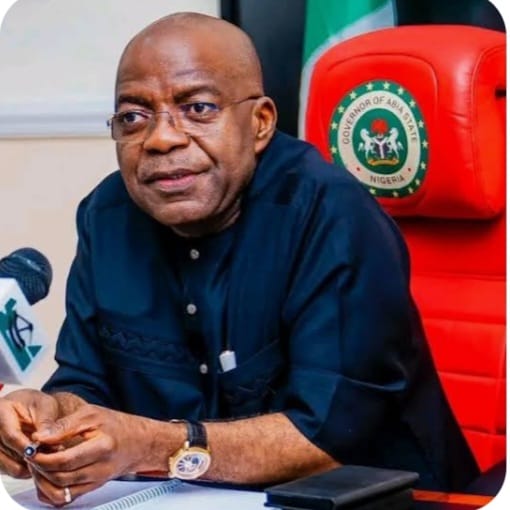
Lack of Understanding or Legitimate Concern? Otti’s Defence of Tinubu’s Tax Reform Sparks National Debate
By George Omagbemi Sylvester | SaharaWeeklyNG
“Abia Governor Alex Otti argues critics misunderstand the overhaul of Nigeria’s tax laws, but the controversy reveals deeper anxieties about governance, transparency and economic strain.”
When Abia State Governor Alex Otti publicly defended President Bola Ahmed Tinubu’s newly enacted tax reform laws on February 13, 2026, he did more than just push back at critics, he threw the spotlight back on a fulcrum issue dividing Nigeria’s political and economic classes. Otti’s assertion that Nigerians attacking the tax policy “lack understanding” crystallises a broader fracture in public discourse over fiscal policy, governance and the future of the Nigerian economy.
The comments from Governor Otti came amid an intensifying national conversation over sweeping tax reforms signed into law in June 2025, designed to modernise Nigeria’s tax architecture and expand revenue mobilisation. These reforms (long in the making and championed by a Presidential Fiscal Policy and Tax Reforms Committee chaired by Prof. Taiwo Oyedele) mark the most far‑reaching overhaul of federal tax laws in decades. They include restructuring the Federal Inland Revenue Service into the National Revenue Service (NRS), establishing a Tax Appeal Tribunal and Ombudsman Office, and unifying revenue collection frameworks to improve transparency and efficiency.
Governor Otti’s praise for the new legislation resonated with elements of his own fiscal thinking. Drawing on economic positions he articulated nearly a decade ago, he argued that key principles now entrenched in the law reflect sound fiscal reasoning and long‑standing proposals to strengthen Nigeria’s economic foundations. “Almost 10 years ago, I wrote about the fiscal side of things,” Otti said. “When I read the new tax reform law, I saw many of those arguments reflected in it. I thank Prof. Oyedele. When people attack him, they don’t understand.”
Yet, while Otti’s intervention was meant to de‑escalate public criticism, it instead exposed how complex and emotionally charged the issue of taxation has become in Nigeria. Critics, both inside and outside government, argue that the reforms have not been adequately explained to citizens and that many fear the measures will aggravate hardship amid already high costs of living. One prominent voice of dissent, fiscal policy analyst Aborisade, warned that without transparency and clear communication on how tax revenues will be collected and returned to the people, “these reforms risk becoming deeply unpopular.” Critics also highlight that any tax increase implemented without demonstrable improvements in public services could fuel resentment and mistrust in governance.
That mistrust is not abstract. For years, Nigeria has struggled with weak tax compliance, low revenue‑to‑GDP ratios compared with other emerging economies, and public scepticism over how government revenues are utilised. Many Nigerians remember episodes where policy changes were not accompanied by visible improvements in infrastructure, healthcare or power delivery, reinforcing the belief among skeptics that new taxes equate to greater burden with little reward.
For supporters like Otti and others in government policy circles, the reforms represent a long‑overdue attempt to widen the tax net and reduce Nigeria’s chronic dependence on volatile oil revenues. Advocates argue that a modernised tax system can enhance domestic revenue mobilisation, reduce fiscal deficits, and create a more resilient economy. They point out that reforms provide exemptions and reliefs for low‑income earners and small businesses and are aimed at building a fairer, more transparent system for all stakeholders.
Still, bridging the gap between these competing narratives is challenging. Opposition voices contend that even well‑designed tax policy may fail if the state lacks the capacity to implement it equitably or if the public’s confidence in leadership remains weak. “Without accountability and clear benefits for their contributions, any tax reform risks becoming deeply unpopular,” Aborisade emphasised, warning that heavy taxation without trust can fracture the social contract.
The debate over Tinubu’s tax reform illustrates a deeper truth about contemporary Nigeria: that economic policy no longer exists in a vacuum but is deeply intertwined with public sentiment, political legitimacy, and social cohesion. As one respected economist put it, “Taxation is not just a fiscal tool, it is a trust‑building exercise between the state and its citizens.” When that trust is fragile, even technically sound reforms can be seen as punitive rather than constructive.
Analysts suggest that meaningful public engagement (including sustained information campaigns, transparent revenue utilisation reporting and constructive dialogue with civil society) is essential to soothe anxieties and build confidence in the new system. Without this, what began as an effort to stabilise public finances could widen political and social divides.
In defending the tax reforms, Governor Otti has framed the challenge as one of comprehension rather than critique. But the controversy unfolding across Nigeria is not simply about misunderstanding; it underscores a profound gap between policy design and public perception. For a reform of this magnitude to succeed, Nigerians must be assured not only of its economic merits, but also of its fairness, transparency and tangible impact on everyday lives.
As the implementation phase continues through 2026 and beyond, the Tinubu administration, state governments and economic stakeholders face the critical task of translating legislative change into broader public trust – a task as difficult as any technical reform the tax laws themselves seek to achieve.
Politics
Cubana Chief Priest Backs Tinubu Ahead of 2027, Signalling Shift in Celebrity Political Alignments
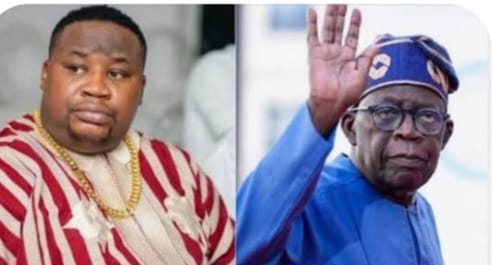
Cubana Chief Priest Backs Tinubu Ahead of 2027, Signalling Shift in Celebrity Political Alignments
By George Omagbemi Sylvester | SaharaWeeklyNG
“Socialite’s public declaration underscores growing intersection of business, entertainment and electoral politics as Nigeria inches toward another high-stakes presidential race.”
A prominent Nigerian socialite and nightlife entrepreneur, Pascal Okechukwu (popularly known as Cubana Chief Priest) has publicly declared his support for President Bola Ahmed Tinubu ahead of the 2027 presidential election, in a move that has stirred debate across Nigeria’s political and social media landscapes.
The declaration emerged in early February 2026 through a series of Instagram posts and public exchanges with critics and followers. In those posts, the celebrity businessman stated unequivocally that he would align himself with Tinubu’s political camp and work against the anticipated presidential bid of former Anambra State governor and Labour Party figure, Peter Obi.
Cubana Chief Priest, who commands a large following across Nigeria’s entertainment and hospitality sectors, framed his decision as both a political and economic calculation. In one exchange, he argued that as an employer and businessman, he preferred collaboration with the incumbent administration rather than opposition politics.
He also publicly declared that he and his family had chosen to “stay with the moving train” of Tinubu’s “Renewed Hope” agenda, signalling clear political alignment with the ruling All Progressives Congress (APC).
The shift is politically significant because the socialite had previously been associated with Peter Obi during the 2023 presidential election cycle. In his own words, he acknowledged that he worked for Obi during that campaign, even while holding an advisory role to an APC-aligned state government.
His new stance therefore represents a notable reversal, particularly within the South-East business community, where Obi enjoyed strong support during the last election.
The controversy surrounding the declaration intensified after an online clash between Cubana Chief Priest and social commentator Isaac Fayose, the brother of former Ekiti State governor Ayodele Fayose. The dispute centred on the socialite’s decision to align with Tinubu’s political movement, with Fayose accusing him of opportunism. In response, Cubana Chief Priest defended his position, arguing that political alignment was a practical choice for a businessman responsible for large-scale employment.
He also linked his support for the APC government to broader political objectives, including the potential release of detained pro-Biafra leader Nnamdi Kanu, stating that such outcomes were more achievable from within the ruling political structure than from opposition ranks.
Beyond social media statements, reports indicate that Cubana Chief Priest has expressed interest in running for a seat in the House of Representatives in 2027 under the APC platform, suggesting that his endorsement of Tinubu is part of a deeper political ambition rather than a mere celebrity opinion.
News reports also describe his announcement of political plans and explicit backing of Tinubu as part of the emerging alignment of business figures with the president’s second-term project.
The development coincides with political moves by his associate, the businessman Obinna Iyiegbu, popularly known as Obi Cubana, who has also been linked to pro-Tinubu political structures ahead of 2027.
This clustering of influential entrepreneurs around the ruling party has prompted renewed discussion about the growing role of celebrity endorsements and business interests in Nigeria’s electoral politics.
Political analysts say such endorsements, while often symbolic, can influence public perception, especially among young voters who are heavily engaged with celebrity culture. As political scientist Larry Diamond once observed, “In transitional democracies, informal power networks (business elites, media figures, and celebrities) can shape political outcomes as much as formal party structures.”
Similarly, Nigerian scholar Professor Jibrin Ibrahim has argued that “the fusion of business capital and political capital is one of the defining features of contemporary Nigerian politics.”
However, critics warn that celebrity political alignments rarely translate into structured policy debates or ideological clarity. Economist Pat Utomi has repeatedly cautioned that “Nigeria’s democracy suffers when politics becomes an extension of celebrity influence rather than a contest of ideas and development strategies.”
For now, Cubana Chief Priest’s declaration remains a personal political endorsement rather than an official party appointment at the national level. Yet its timing (more than a year before the formal campaign cycle for 2027) illustrates how early positioning has already begun among Nigeria’s political and business elites.
Key figures involved:
Pascal Okechukwu (Cubana Chief Priest): Socialite and businessman who declared support for Tinubu.
President Bola Ahmed Tinubu: Incumbent Nigerian president expected to seek re-election in 2027.
Peter Obi: Former Anambra governor and likely opposition contender.
Isaac Fayose: Social commentator who criticised the endorsement.
Obinna Iyiegbu (Obi Cubana): Business associate linked to pro-Tinubu political structures.
As Nigeria moves gradually toward the 2027 electoral cycle, the intersection of celebrity influence, business interests and party politics is likely to intensify, raising fresh questions about the nature of democratic mobilisation in Africa’s most populous nation.
-

 celebrity radar - gossips6 months ago
celebrity radar - gossips6 months agoWhy Babangida’s Hilltop Home Became Nigeria’s Political “Mecca”
-

 society6 months ago
society6 months agoPower is a Loan, Not a Possession: The Sacred Duty of Planting People
-

 news6 months ago
news6 months agoTHE APPOINTMENT OF WASIU AYINDE BY THE FEDERAL GOVERNMENT AS AN AMBASSADOR SOUNDS EMBARRASSING
-

 Business6 months ago
Business6 months agoBatsumi Travel CEO Lisa Sebogodi Wins Prestigious Africa Travel 100 Women Award








